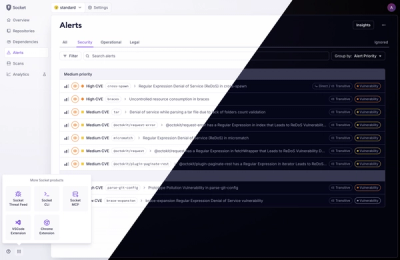
Product
A Fresh Look for the Socket Dashboard
We’ve redesigned the Socket dashboard with simpler navigation, less visual clutter, and a cleaner UI that highlights what really matters.
github.com/drone/routes
a simple http routing API for the Go programming language
go get github.com/drone/routes
for more information see: http://gopkgdoc.appspot.com/pkg/github.com/bradrydzewski/routes
package main
import (
"fmt"
"github.com/drone/routes"
"net/http"
)
func Whoami(w http.ResponseWriter, r *http.Request) {
params := r.URL.Query()
lastName := params.Get(":last")
firstName := params.Get(":first")
fmt.Fprintf(w, "you are %s %s", firstName, lastName)
}
func main() {
mux := routes.New()
mux.Get("/:last/:first", Whoami)
http.Handle("/", mux)
http.ListenAndServe(":8088", nil)
}
You can create routes for all http methods:
mux.Get("/:param", handler)
mux.Put("/:param", handler)
mux.Post("/:param", handler)
mux.Patch("/:param", handler)
mux.Del("/:param", handler)
You can specify custom regular expressions for routes:
mux.Get("/files/:param(.+)", handler)
You can also create routes for static files:
pwd, _ := os.Getwd()
mux.Static("/static", pwd)
this will serve any files in /static, including files in subdirectories. For example /static/logo.gif or /static/style/main.css.
You can apply filters to routes, which is useful for enforcing security, redirects, etc.
You can, for example, filter all request to enforce some type of security:
var FilterUser = func(w http.ResponseWriter, r *http.Request) {
if r.URL.User == nil || r.URL.User.Username() != "admin" {
http.Error(w, "", http.StatusUnauthorized)
}
}
r.Filter(FilterUser)
You can also apply filters only when certain REST URL Parameters exist:
r.Get("/:id", handler)
r.Filter("id", func(rw http.ResponseWriter, r *http.Request) {
...
})
You can use helper functions for serializing to Json and Xml. I found myself constantly writing code to serialize, set content type, content length, etc. Feel free to use these functions to eliminate redundant code in your app.
Helper function for serving Json, sets content type to application/json:
func handler(w http.ResponseWriter, r *http.Request) {
mystruct := { ... }
routes.ServeJson(w, &mystruct)
}
Helper function for serving Xml, sets content type to application/xml:
func handler(w http.ResponseWriter, r *http.Request) {
mystruct := { ... }
routes.ServeXml(w, &mystruct)
}
Helper function to serve Xml OR Json, depending on the value of the Accept header:
func handler(w http.ResponseWriter, r *http.Request) {
mystruct := { ... }
routes.ServeFormatted(w, r, &mystruct)
}
FAQs
Unknown package
Did you know?

Socket for GitHub automatically highlights issues in each pull request and monitors the health of all your open source dependencies. Discover the contents of your packages and block harmful activity before you install or update your dependencies.

Product
We’ve redesigned the Socket dashboard with simpler navigation, less visual clutter, and a cleaner UI that highlights what really matters.

Industry Insights
Terry O’Daniel, Head of Security at Amplitude, shares insights on building high-impact security teams, aligning with engineering, and why AI gives defenders a fighting chance.

Security News
MCP spec updated with structured tool output, stronger OAuth 2.1 security, resource indicators, and protocol cleanups for safer, more reliable AI workflows.